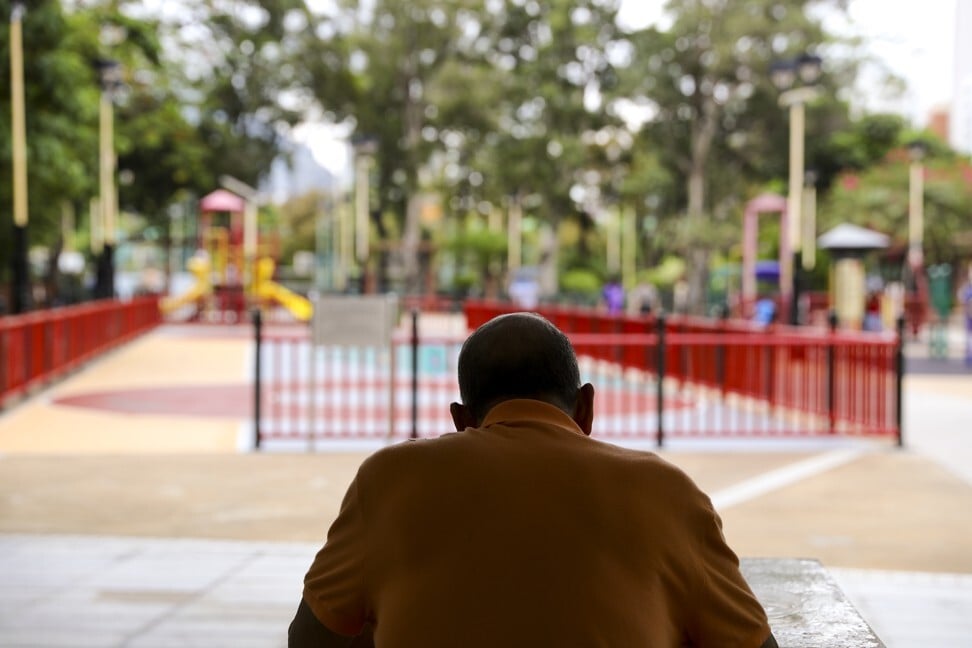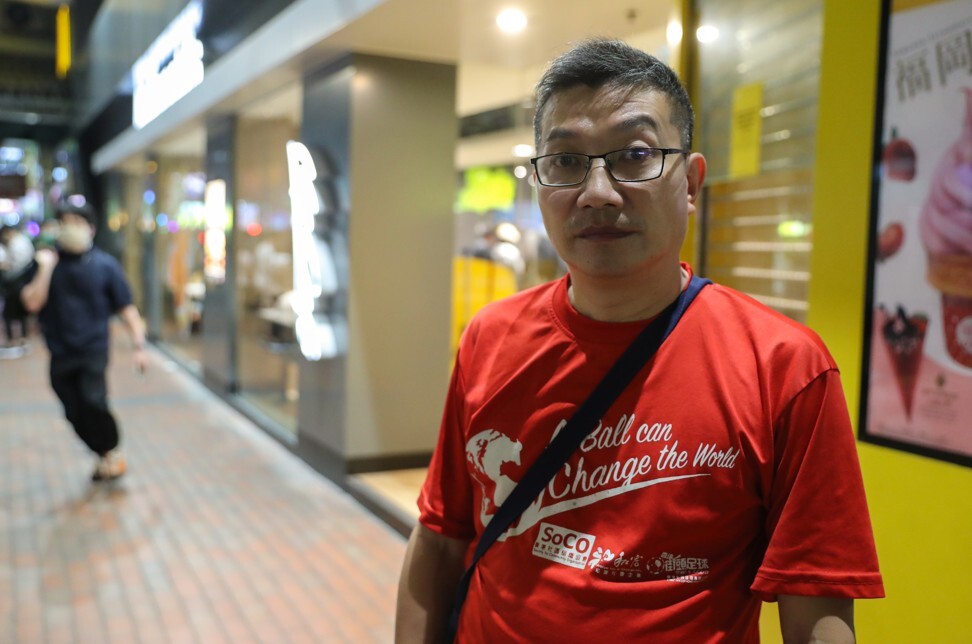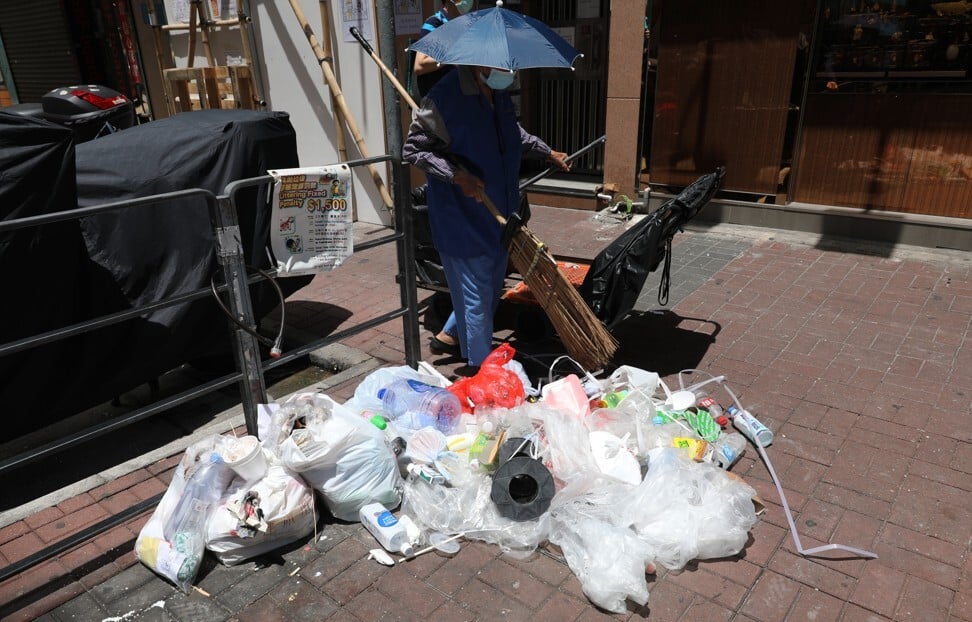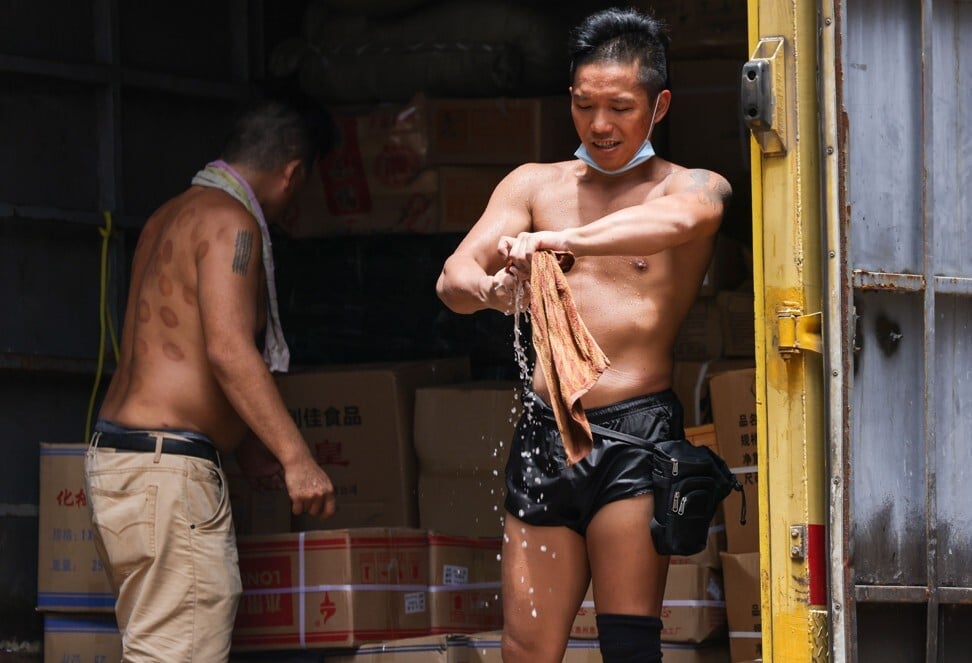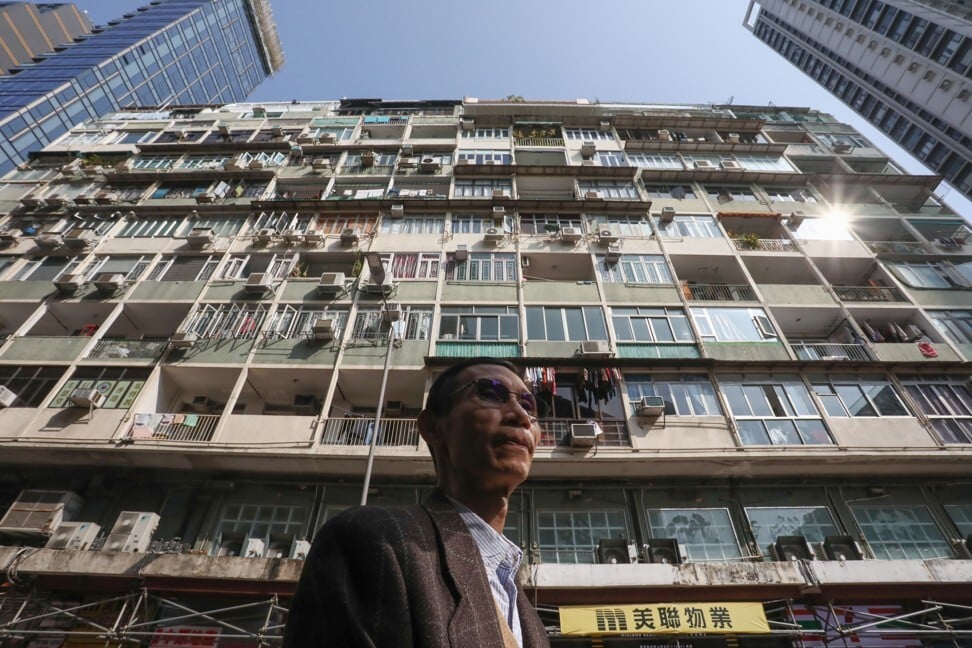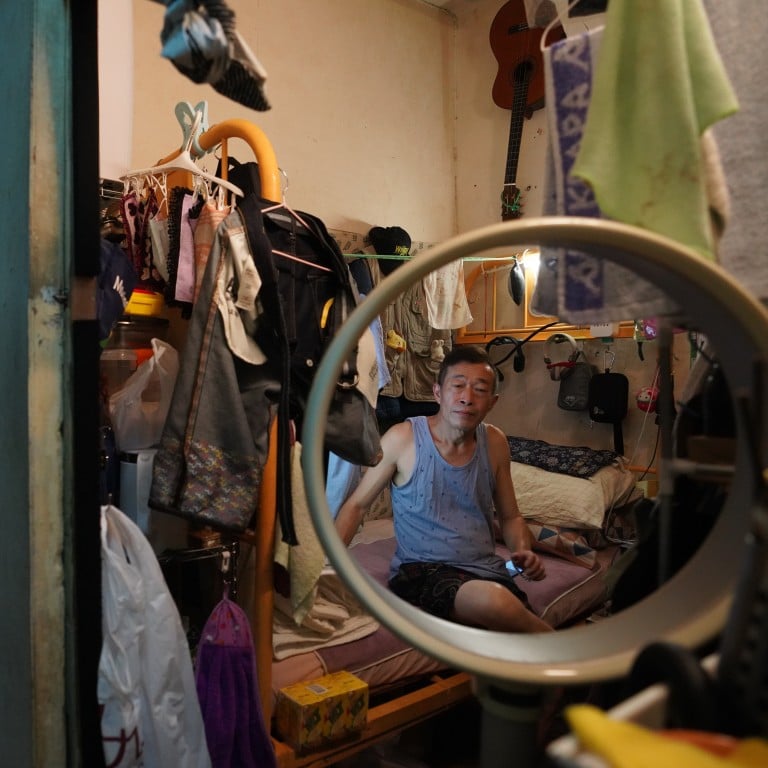
Hot, hot Hong Kong: sweltering summer days ahead, after city records warmest spring
- Concerns rise for outdoor workers, homeless people, who will need more help to beat the heat
- Global warming blamed for city’s hottest May, with 12 ‘very hot’ days and 14 ‘hot’ nights
Dai Ching-yuen bought an air conditioner as soon as he saved enough earlier this year, to fend off Hong Kong’s sweltering summer heat.
The 56-year-old and his girlfriend, both Hongkongers, live in a 50 sq ft windowless cubicle, one of 10 subdivided units in an 800 sq ft flat in a dilapidated four-storey tenement in Sham Shui Po.
He recalls tossing and turning through many a hot summer night over the past three years, and having to shower four or five times on some days to keep fresh.
Dai earns about HK$8,000 a month as a part-time warehouse worker and his 57-year-old partner, a former supermarket worker, is jobless. Their tiny unit, which costs HK$2,500 a month, is all he can afford, he says.
Spending HK$4,800 on an air conditioner was a big splurge for them, but Dai says: “Summer is unbearable in Hong Kong, with all this heat and humidity. This year is even worse.”
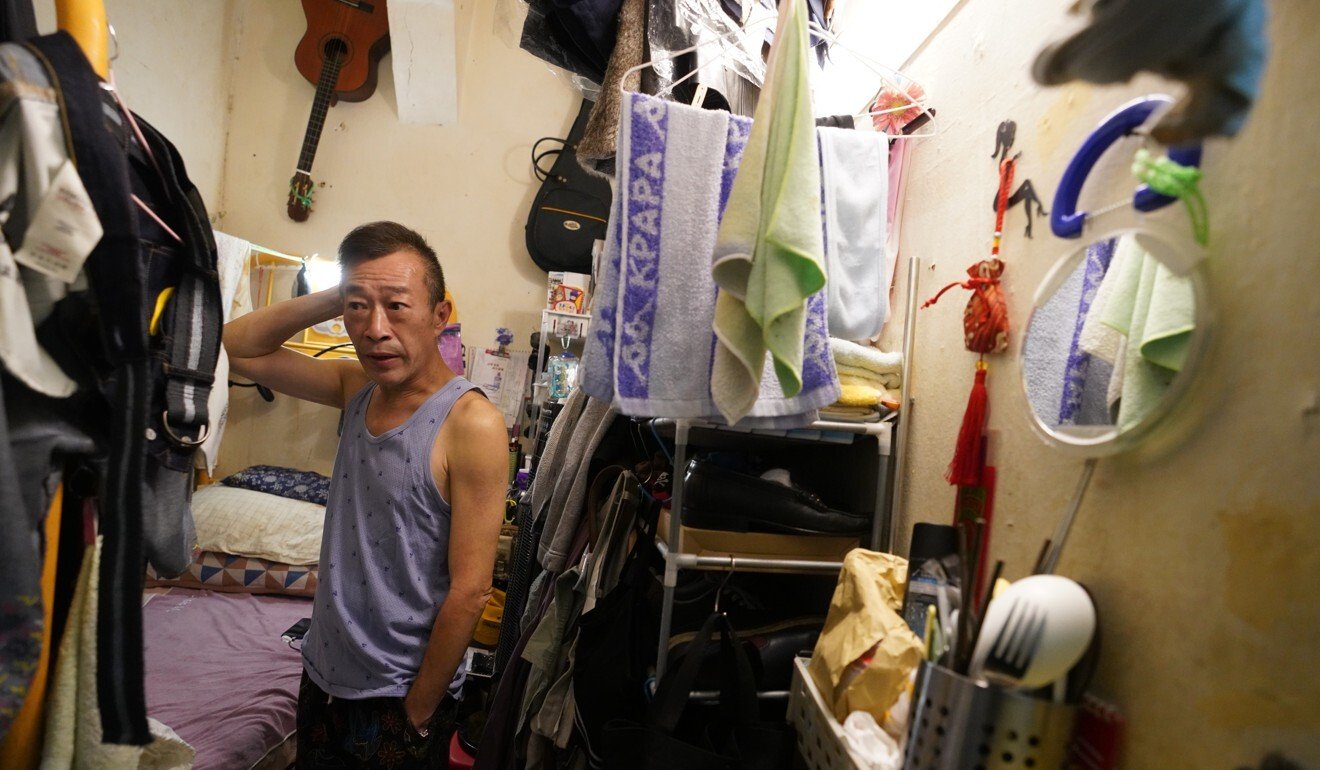
The city had its hottest May on record this year, with a monthly mean temperature of 29 degrees Celsius, 2.7 degrees above the normal level.
The mercury rose above 36 degrees on May 23, making it the hottest day in May on record.
The Hong Kong Observatory recorded 12 “very hot days”, when the daily maximum temperature hit 33 degrees or above, and 14 “hot nights”, when the lowest temperature was 28 degrees or above, in May. Only one very hot day and one hot night were recorded in May last year.
Hot weather petition with 100,000 signatures pours heat on prison bosses
Meteorologist Lam Chiu-ying, former Observatory director, says: “This is definitely an anomaly.”
After exceptionally warm weather in March and April, the city experienced the warmest spring on record from March to May this year, with a mean temperature of 25 degrees.
Lam says this is part of global warming, while densely built-up Hong Kong also experiences a heat island effect, with urban areas being warmer than more rural areas. Heat generated by increased power consumption, including for air conditioning, is a factor contributing to warmer temperatures too.
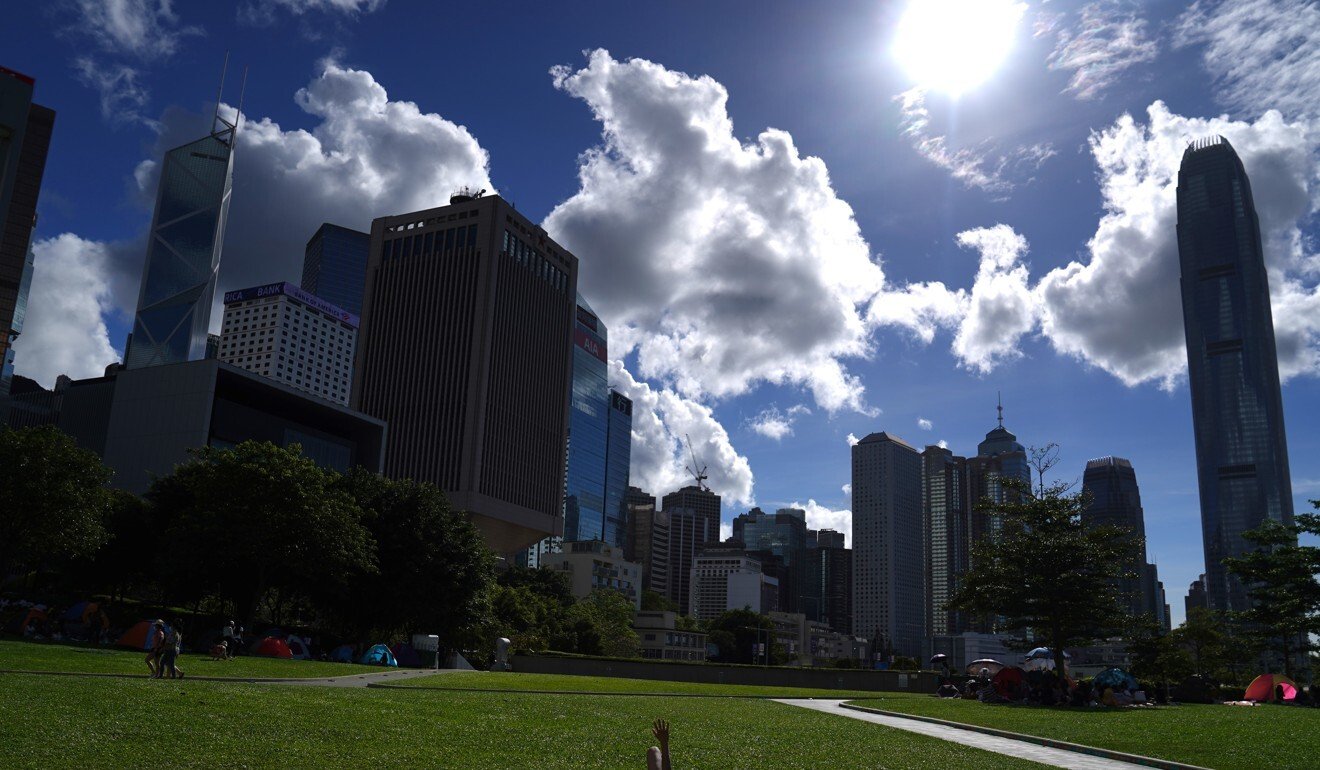
He says this year’s conditions have also been influenced by the presence of a weather phenomenon known as a subtropical ridge over southern China that has brought less rainfall in Hong Kong and pushed up the city’s temperatures.
Globally, the decade between 2011 and 2020 was the warmest on record. Last year was one of the three warmest years on record, according to the World Meteorological Organization.
In Hong Kong, the annual mean temperature last year was 24.4 degrees, the second warmest since records began in 1884, with 11 months that were warmer than usual. The Observatory recorded 47 very hot days and 50 hot nights last year, both record highs.
Meteorologists have predicted that this summer could be among the hottest Hong Kong has known.
‘Not enough night shelters for homeless’
Social workers say the unusually hot weather has made life more challenging for more than 1,500 homeless people in the city.
Wan Suk, 77, spends his nights at Fa Hui Park in Mong Kok, but takes refuge in shopping centres in the daytime, although security guards sometimes ask him to leave.
A street sleeper for more than 10 years, he says summers can be so unbearable that he showers three times a day at a public bathhouse, and covers his face with a wet towel to stay cool.
When the days become hotter, he moves to the waterfront area near the Hong Kong Cultural Centre in Tsim Sha Tsui, where the sea breeze provides some relief at night.
The government runs 19 temporary night heat shelters across Hong Kong during summer, but these open only from 10.30pm to 8am on days when the Observatory’s “very hot weather” warning remains in force beyond 4.30pm.
The air-conditioned shelters can take in people for the night, and provide food, water, a mattress and blanket free of charge.
But Wan Suk says these shelters are usually crowded, and he has tried several times to get a mattress for the night but failed.
Ng Wai-tung, a community organiser of the Society for Community Organisation, says that summer has always been a challenging time for the city’s homeless.
He says with McDonald’s restaurants closed overnight because of Covid-19 pandemic restrictions, more than 400 “McRefugees” who used to head for the fast food chain’s 24-hour outlets are back on the streets.
Ng says the existing night heat shelters do not open every day, and even if they do, it is late at night. Some are in remote locations or too small to take in all those in need. He says the government should open more of these shelters, and add shower and locker facilities.
Observatory says city’s residents should expect another sweltering summer
Too hot for cleaners, construction workers
Dr Edmund Lam Wing-wo, a family doctor, says he sees about five patients a day suffering from heat exhaustion, more than during this period in previous years. In the past, the number usually surged only in June and July.
He says because of the pandemic, more Hongkongers have been going hiking as they cannot travel, and some suffer heat exhaustion while outdoors. People also tend to drink less water while wearing masks, and this also makes them more vulnerable to the heat, he says.
Leung Tsz-yan, organiser of the Cleaning Workers Union, which has about 300 members, says many cleaners have complained that the early arrival of the hot weather has made their work more challenging.
She says cleaning companies are not doing enough to help these workers cope with the heat, by providing them with water, allowing more down time or flexible work hours to avoid heat, as well as providing the right clothing and hats to protect them from the sun. During this time, the workers also need more masks so they can change frequently, she says.
Wong Ping, chairman of the Hong Kong Construction Industry Employees General Union, says some construction workers have already suffered heatstroke this year from working outdoors and being exposed to the sun for long hours.
He says most construction sites have sunshade facilities and water mist spray for cooling, but workers need more cool drinking water and should be allowed to rest when the “very hot weather” warning is in force.
Former labour sector lawmaker Bill Tang Ka-piu, with the Hong Kong Federation of Trade Unions, says heat-related health problems at work are considered occupational injuries and victims are entitled to compensation, but their cases are not easy to prove.
He says Hong Kong has no laws regulating the work environment in hot weather, while the Occupational Safety and Health Ordinance is too general.
“In most cases, the Labour Department only investigates after an incident occurs,” he says. “This is far from ideal.”
He wants the government to establish clear laws to apply during a “very hot weather” warning. Among other things, he suggests that outdoor workers should not be asked to work continuously for an hour without rest, and those working indoors must have a well-ventilated environment.
Last month, more than 100,000 Hongkongers signed a petition initiated by prisoners’ rights group Wall-fare, urging authorities to roll out special measures for inmates during the hot weather, including improving ventilation, increasing the number of shower times and offering cold drinking water.
The extreme heat has also prompted the Hong Kong Football Association to adjust the start time of the remaining matches of the 2020-21 Hong Kong Premier League, after players complained about recent matches held in the afternoon. Starting times for afternoon matches have been pushed back by at least an hour.
Stay cool, but go green
While the hot weather drives many more in Hong Kong to turn on the air conditioning or install air conditioners, green activists warn that this only worsens global warming.
According to official data released last year, air conditioning consumed the most electricity in 2018, accounting for almost a third of total consumption. The use of air conditioning has also been rising over the years.
Edwin Lau Che-feng, founder and executive director of the environmental group The Green Earth, says summer time is normally the peak for electricity consumption in Hong Kong because of the increased use of air conditioning in homes, offices and other public places.
Many, including government offices, overuse or waste the air conditioning, by using it for too long, setting temperatures lower than the recommended 25.5 degrees, and using it in open areas, he says.
“The excessive use of air conditioning leads to huge power consumption, and causes more carbon emissions that hurt our environment,” he says.
He suggests using electric fans, curtains or energy-saving air conditioners to keep cool, and calls for better energy management for commercial use.
“We should seriously stop excessive power consumption and turn to a sustainable consumption lifestyle,” he says. “We should optimise the balance between comfort and energy-saving.”
Lau, who is in his 60s, says he turns on the air conditioner in his bedroom only at 11.30pm, when he goes to bed, and switches it off at 6.30am.
During the daytime, when he works from home, he draws the curtains to keep out the sunlight, and uses an electric fan.
“I only use the air conditioner when it is needed, not casually,” he says.


